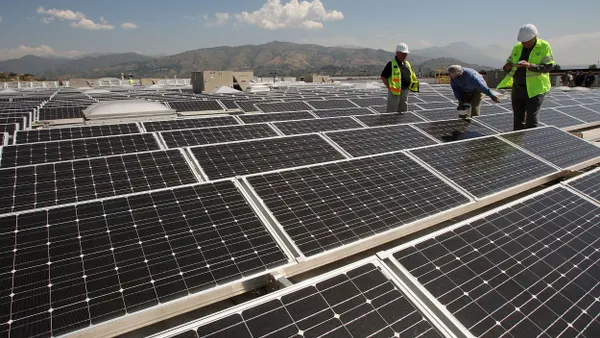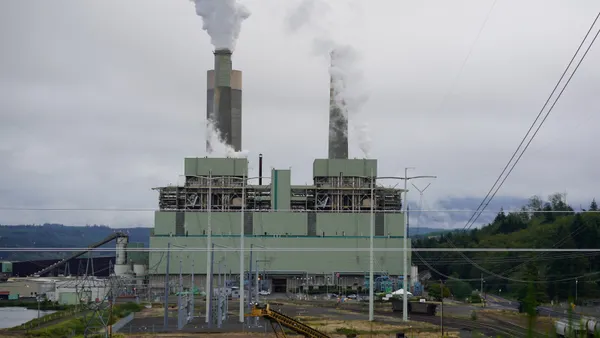Dive Brief:
- The chair of the Federal Energy Regulatory Commission said he will speak with commission staff about a recent ex parte communication between a FirstEnergy lawyer and FERC regulator on the commission regarding a decision on a power plant sale.
- FERC Chairman Kevin McIntyre said Commissioner Neil Chatterjee did "exactly the right thing" by immediately reporting a communication with attorney Bill Scherman concerning FERC's decision to reject the sale of a coal power plant. McIntyre said he and Scherman are "old friends," but did not speak to him regarding the case.
- FERC on Thursday also proposed to adopt cybersecurity standards for electricity supply chains and McIntyre fielded questions regarding federal tax cuts and the agency's pending gas infrastructure review, saying he aims for "ample opportunity for stakeholders to weigh in."
Dive Insight
FERC's decision on a FirstEnergy coal plant sale last week was notable not just for its content, but the circumstances surrounding its release.
On Jan. 12, FERC rejected an attempt by FirstEnergy to sell a coal plant from its merchant generator to two of its regulated utilities in West Virginia, saying they did not properly evaluate alternatives to the financially struggling plant.
A day before the ruling, Chatterjee released a notice of an ex parte — or outside — communication with Bill Scherman, a Gibson Dunn attorney and former FERC general counsel working the case for FirstEnergy. First reported by Politico, the memo said that Scherman contacted Chatterjee on Jan. 11 concerned that FERC would reject the sale.
"Mr. Scherman also stated that he would prefer that the Commission set the issue for hearing instead of issue an adverse order," Chatterjee wrote. "As soon as I realized that Mr. Scherman's communication concerned the merits of the contested proceeding, I terminated the communication and did not respond to Mr. Scherman's statements."
McIntyre lauded Chatterjee's decision, saying FERC's system for ex parte reporting "worked perfectly." But reporters pressed the chairman on how Scherman was able to get information on the ruling and whether he contacted other regulators. Leaks from FERC are rare, especially to parties with interest in a pending decision.
"I'll be discussing it with my staff," McIntyre said of the leak. "Bill Scherman and I are old friends. I consider him a terrific lawyer and a good friend. In this instance I had no contact with him about the matter that you raise."
Pipeline review
McIntyre also addressed FERC's upcoming review of gas infrastructure announced in December. Before the Thursday meeting, environmental protestors pinned lists of eight "demands" for the pipeline review, including enhanced participation for communities affected by development.
"FERC should begin the 1999 Policy Statement review process with no less than six public hearings held in affected communities across the nation," wrote the groups, including Delaware Riverkeeper and Beyond Extreme Energy. Two anti-pipeline protestors were removed from the meeting for disrupting proceedings.
Asked about public participation, McIntyre said the "specific format" for the review has not been determined, but it could take the form of a Notice of Inquiry or a technical conference. That is likely to disappoint activists, who say FERC's normal process of stakeholder input in such forums prioritizes industry voices while sidelining communities affected by pipeline development.
Those activists would rather FERC hold open hearings where commissioners can speak with community members — something McIntyre said hasn't yet entered into the reckoning for the review.
"I hadn't given that specific aspect of it thought yet," he said. "But ... there will be ample opportunity and we want to hear from people from all perspectives."
A central question in that pipeline review is expected to be how to judge the need for new interstate gas pipelines. FERC today relies on precedent agreements, but Commissioners LaFleur and Glick, both Democrats, have said other tests may be needed to ensure pipelines are not overbuilt. Republicans Chatterjee and Commissioner Robert Powelson, meanwhile, see no reason to change the current model.
McIntyre, also a Republican, refused to wade into the debate ahead of the formal infrastructure review.
"I can conceive of a number of different ways in which one could try to get a gauge on project need, but I’m not going to pre-judge that now," he said. "We are looking forward to hearing what everybody’s ideas are."
Cyber supply chain order
During the meeting, FERC regulators unanimously approved an order to adopt cybersecurity standards developed by the National Electric Reliability Corporation (NERC) to protect elements in the electricity supply chain, such as power grid software systems supplied to utilities by third parties.
The vote came in response to a July 2016 FERC order directing NERC to update its Critical Infrastructure Protection standards to include elements of the supply chain. Regulators said in a release that NERC's new standards represent "substantial progress," but there remains a "significant cyber security risk" because they exclude "Electronic Access Control and Monitoring Systems (EACMS), Physical Access Controls (PACs) and Protected Cyber Assets (PCAs)."
"To address that gap, FERC proposes to direct NERC to include EACMS associated with medium- and high-impact bulk electric system cyber systems within the scope of the supply chain risk management Reliability Standards," regulators wrote in a release, "as well as to evaluate the risks presented by PACs and PCAs as part of a study already proposed by the NERC Board."
Tax cuts
McIntyre also gave some indication as to how FERC could handle the impacts of a corporate tax reduction signed into law last year.
A number of state utility commissions have directed regulated utilities to return the savings from the tax bill to customers. Earlier this month, the attorneys general of 12 states wrote to FERC asking regulators to adjust revenue requirements for public utilities under their jurisdiction to reflect the lower tax rate.
"The historic tax reform measure could provide utility users sizeable rate reductions, between $80 to 90 per year," Commission Powelson said in his opening statement. "I hope we do our part to make sure these tax benefits are accrued to energy users here in America."
McIntyre agreed, but said it is yet to be determined whether that rate review would happen in a new docket or ongoing proceedings.
"It could be a combination," McIntyre said. "I certainly agree with the sentiment expressed by Commissioner Powelson that where there is an opportunity to flow savings to customers we should look for opportunities to do that."













